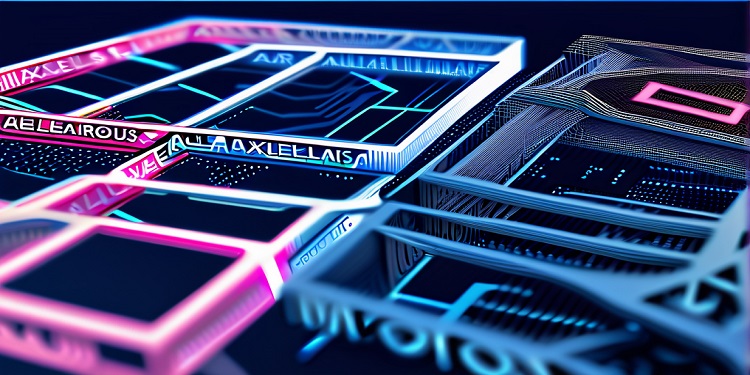Axelar, a prominent figure in blockchain interoperability, has officially launched the Mobius Development Stack (MDS) on its mainnet following approval through on-chain governance. As the first comprehensive interoperability platform, MDS provides customizable and self-service integration for on-chain and off-chain systems, opening up new possibilities for decentralized applications (dApps). With MDS, the blockchain landscape is set to expand further, connecting layer 1 ecosystems such as Solana, Stellar, Sui, and XRP Ledger through its newly introduced Interchain Amplifier.
Axelar’s MDS is positioned to offer a seamless pathway for Web3 developers to connect all blockchains efficiently. The platform aims to enable faster scalability and enhanced user reach, providing a simplified, open stack for cross-chain smart contracts that are both scalable and secure. Prominent adopters of Axelar’s technology include major players like Uniswap, Microsoft, and a host of multichain startups, all seeking to reach broader audiences across different blockchain environments.
Creating a New Era for Web3 Applications
The Mobius Development Stack is expected to redefine how data, value, and users interact in a revamped Web3. Axelar envisions a unified connection that unlocks limitless possibilities for decentralized applications. Developers now have the tools to create applications that not only span multiple chains but also exceed the capabilities of traditional systems in terms of user experience and functionality.
MDS offers a robust platform for developers, enabling them to combine various resources, logic, and value across multiple blockchains without the usual limitations. Axelar executives have emphasized that the stack addresses the fragmented nature of the current blockchain ecosystem, where user experience and developer capabilities have often been restricted. By breaking these barriers, the platform creates a global, decentralized internet landscape that is open, flexible, and fully interoperable.
Axelar’s co-founders believe that traditional interoperability stacks have struggled to keep pace with the rapid growth of the blockchain space. However, they see MDS as a pivotal solution that scales to support thousands of blockchains while maintaining strong security protocols. This allows continuous innovation across the entire stack, providing developers with a means to build dApps that function seamlessly across multiple chains.

Key Features of Mobius Development Stack
MDS introduces several significant features that set it apart from other interoperability platforms. The recently approved Interchain Amplifier enables permissionless, customizable integrations with diverse consensus mechanisms like Flow, Hedera, and others. Additionally, Axelar’s Interchain Token Service (ITS) allows for the rapid tokenization of both crypto assets and real-world assets such as real estate, enabling liquidity and fractional ownership across various chains.
Moreover, MDS acts as a gateway between traditional Web2 systems and the Web3 environment, facilitating interactions between off-chain actors and decentralized applications through a secure, single transaction on the Axelar network. This functionality enhances the integration of traditional and blockchain-based systems, creating an omnichain user experience that developers can leverage to engage users across multiple blockchain networks.
Collaborations and Ecosystem Integration
MDS has garnered attention from leading blockchain ecosystems, with several key partnerships and collaborations emerging as part of its rollout. Developers within the Sui ecosystem, for instance, are leveraging MDS to integrate new innovations such as Mysticeti, a consensus algorithm that delivers industry-leading transaction speeds. Axelar’s collaboration with Stellar aims to strengthen the latter’s position within the decentralized finance (DeFi) space, with MDS providing developers with the tools to build more secure, modular cross-chain applications.
Axelar has also collaborated with financial services firms to connect private blockchain environments with public layer 1s, unlocking the potential of tokenized assets. This integration is expected to accelerate real-world asset tokenization, particularly in traditional finance, and drive the adoption of decentralized finance solutions.
Enhanced Security and Institutional Adoption
Axelar is also setting new standards for security in the blockchain space. Through its integration with Babylon and EigenLayer, MDS will provide Bitcoin- and Ethereum-level security to cross-chain interactions, addressing the needs of institutional participants. This heightened security is critical for projects that manage large amounts of total value locked (TVL) in the decentralized ecosystem.
The new security model introduces a staking mechanism, where verifiers post collateral in Axelar’s native AXL token, along with restaked ETH and BTC. Additionally, a proposal to burn transaction fees instead of redistributing them to tokenholders is expected to streamline network performance and make it more efficient.
Empowering Developers from Day One
Axelar’s integration with OpenZeppelin, a leader in Web3 developer tools, will offer an open interface compatible with all major interoperability protocols. This vendor-agnostic approach enables dApp developers to build cross-chain applications from the start of their development process, ensuring multichain functionality from day one.
With the launch of Mobius, Axelar’s MDS aims to empower Web3 developers to build, innovate, and scale their applications in a secure and interoperable environment. By offering a comprehensive solution for blockchain connectivity, the platform is poised to accelerate the adoption of decentralized applications across a globally decentralized network.

